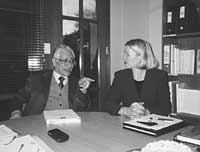The objective of the CouncilÂs institutional and professional links program is to foster bilateral contacts that will strengthen links between key institutions in Australia and India, such as universities, libraries, museums, technical colleges, research institutes, professional organisations and appropriate non-government organisations, with a view to promoting the long-term bilateral commercial relationship.
The Council has supported, over several years, a wide range of projects designed to promote closer links between the Australian and Indian legal sectors and to demonstrate Australian legal capabilities in India. One of the major Council-funded law projects has been to introduce Australian mediation and conciliation practices to the Indian legal, government and business communities. As well as enhancing the efficiency of the Indian legal system, the project has strengthened links between the Australian and Indian legal professions and has sought to facilitate the operations of Australian companies in India.
The Council-funded workshop at the ILS Law College, Pune, in January 2000 on court dispute resolution in environmental law attracted high-level Indian legal participation, including Justice Y K Sabarwal, Chief Justice of the Bombay High Court (left), Justice N Venkatachala (Chairman of the National Environment Appellate Authority) and Dr S P Sathe (Director of the Institute of Advanced Legal Studies). The workshop stimulated strong interest in the concept of specialist environmental courts for India. (Brian Hayes)
Following on from the success of the training program in conciliation practices conducted by Lawyers Engaged in Alternative Dispute Resolution (LEADR) in Mumbai, New Delhi and Calcutta in January 1998 and in New Delhi, Bangalore and Calcutta in February 1999, the Council agreed to provide funding to LEADR to conduct follow-up training for Indian mediation and conciliation trainers in Sydney in October 1999. Participants included Mr Firdosh Karachiwalla from Mumbai, Mr Fortunato de Melo from Goa and Captain Ashok Bansal from Chennai. Mr G K Kwatra also attended the workshops as a representative of the Indian Council of Arbitration.
The Council provided funding to Mr Brian Hayes QC of the Adelaide-based International Environmental Legal Consultants to conduct a workshop at the ILS Law College, Pune, in January 2000 on court dispute resolution in environmental law. Other Australian participants included Justice Bruce Debelle of the South Australian Supreme Court, Justice Mahla Pearlman, Chief Judge of the NSW Land and Environment Court, and Judge Christine Trenorden of the South Australian Environment, Resources and Development Court. The workshop attracted high-level Indian legal participation and stimulated strong interest in the concept of specialist environmental courts for India.
The Council took a further initiative to develop AustraliaÂIndia legal links by providing funding to the International Legal Services Advisory Council for a visit to Melbourne, Canberra and Sydney in May 2000 by the Indian Attorney-General, Mr Soli Sorabjee. Mr Sorabjee met with leading legal and governmental figures and delivered a public lecture at the University of Melbourne on legal aspects of freedom of the news media. Mr Sorabjee evinced substantial working knowledge of Australian case law and suggested that there is considerable scope for Australian lawyers and courts to draw on appropriate Indian judgments for their precedent value.
During his AIC-supported visit to Melbourne, Canberra and Sydney in May 2000, the Indian Attorney-General, Mr Soli Sorabjee (left) met with a wide range of leading legal figures including Ms Ann Trimmer, President-elect of the Law Council of Australia (right). (Arjuna Nadaraja, International Legal Services Advisory Council)
To advance initiatives arising from the AIC visit to India in November 1999, the Council provided funding to the Indian Ocean Centre at Curtin University to enable a visit to Australia during May 2000 by Dr Kalpana Desai, Director of the Prince of Wales Museum, Mumbai, the major museum of Western India. Dr Desai held meetings and consultations with directors, curators and conservators at major museums and galleries in Perth, Adelaide, Sydney and Canberra. As a result of her visit, Dr Desai is exploring with her Australian contacts a wide range of possible collaborative projects.
To build on several earlier conservation initiatives, the Council provided funding to Mr Vinod Daniel of the Australian Museum to support a series of visits to India during 2000 and 2001 by Mr Daniel and Professor Ken Taylor of the University of Canberra to provide advice on materials conservation issues, collection transfer and display case design for the planned gallery extension at the Prince of Wales Museum in Mumbai.
The Council provided funding to Mr Nana Laxman of the India Trade Centre, Melbourne, to assist with costs of a visit to Australia by Dr Kiran Bedi, the former Inspector-General of Prisons at Tihar Gaol, New Delhi.
The Council also agreed to provide funding to Mr Anthony McKenzie of the University of Sydney Faculty of Rural Management, Orange, to enable his participation in a professional development workshop on the use of information technology in rural science teaching at Stella Maris College, Chennai, in August 2000 and to conduct workshops at other Indian educational institutions on aspects of flexible delivery of tertiary teaching programs.
| 1-Home | 2 | 3 | 4 | 5 | 6 | 7 | 8 | 9 | 10 | 11 | 12 | 13 | 14 | 15 | 16 | 17 | 18 | 19 | 20 |


